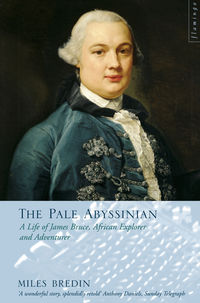
The Pale Abyssinian: The Life of James Bruce, African Explorer and Adventurer
This passage is told us, by scripture, to be a miraculous one; and, if so, we have nothing to do with natural causes. If we do not believe Moses, we need not believe the transaction at all, seeing that it is from his authority alone we derive it. If we believe in God that he made the sea, we must believe he could divide it when he sees proper reason, and of that he must be the only judge.
The captain of the ship had various cargoes which needed collecting and depositing around the Red Sea so Bruce received a guided tour on his way down to Jiddah. He stopped off in Yambo, where the inhabitants were engaged in civil war and where he watched a savage battle which halted only because of a lack of ammunition, and he stretched his legs on islands whose wildlife he decimated in order to vary the constant diet of fish. The voyage gave him time to prepare his mind for Abyssinia and to ponder which towns corresponded with the ones he had read about in the works of the geographers Herodotus and Cosmas Indicoplustes. It was 3 May before they ‘anchored in the port of Jidda, close up on the key, where the officers of the custom-house immediately took possession of our baggage’.
When Bruce had set off to Cosseir across the desert he had been excited by the fact that it was the last of civilization he would see for some time. He had forgotten about Jiddah where British ships from India came to trade with Arabia. They could go no further thanks to insufficient treaties and the treachery of the waters but they were firmly ensconced at the Red Sea port. There was a factory and a small community of British working for the East India Company who had to loiter there in between journeys, waiting for the monsoon trade winds to turn to their advantage. There were nine British merchantmen at anchor when Bruce arrived and paid negotiators were busy making deals in a manner which fascinated him:
They sit down on the carpet, and take an Indian shawl, which they carry on their shoulder, like a napkin, and spread it over their hands. They talk, in the meantime, indifferent conversation, of the arrival of ships from India, or the news of the day, as if they were employed in no serious business whatever. After about twenty minutes spent in handling each other’s fingers below the shawl, the bargain is concluded, say for nine ships, without one word ever having been spoken on the subject, or pen or ink used in any shape whatever. There never was one instance of a dispute happening in these sales.
As a show of good manners as well as a way to ease his passage, Bruce always wore a native costume, usually that of a nobleman. When he went to the Bengal-house to meet his compatriots, however, he was dressed as a Turkish mariner.
I desired to be carried to a Scotchman, a relation of my own, who was then accidentally leaning over the rail of the staircase, leading up to his apartment. I saluted him by his name; he fell into a violent rage, calling me villain, thief, cheat and renegade rascal; and declared, if I offered to proceed a step further, he would throw me over the stairs.
Bruce’s disguise was obviously more effective, considering his size and manner, than one might otherwise have thought. The surly captain and relation was later claimed by James Boswell to be their mutual cousin, Bruce Boswell. He is not named in Bruce’s Travels but, for some unfathomable reason, Boswell made this assertion in an article about his adventurous countryman that he wrote for the London Magazine. Bruce Boswell was indeed the kind of man to behave in such a manner. He was a famously appalling captain and was later cashiered before being accepted back as a trader after his influential cousin had interceded with the board in London. He was at this time only twenty – too young to be a captain – and according to well-kept East India Company records, employed in China. Whoever the man was, he did not give Bruce the reception he had hoped for. The insulted traveller decided to remain incognito and take the measure of the other captains at Jiddah. These captains were a glamorous lot, given to wearing tight, bright breeches, much gold braid and exotically coloured turbans. They adopted the manners of both East and West and were much respected by both. Bruce, however, did not initially warm to them: ‘I thought within myself, if those are their Indian manners I shall keep my name and situation to myself while I am at Jidda’.
Конец ознакомительного фрагмента.
Текст предоставлен ООО «ЛитРес».
Прочитайте эту книгу целиком, купив полную легальную версию на ЛитРес.
Безопасно оплатить книгу можно банковской картой Visa, MasterCard, Maestro, со счета мобильного телефона, с платежного терминала, в салоне МТС или Связной, через PayPal, WebMoney, Яндекс.Деньги, QIWI Кошелек, бонусными картами или другим удобным Вам способом.
Вы ознакомились с фрагментом книги.
Для бесплатного чтения открыта только часть текста.
Приобретайте полный текст книги у нашего партнера:
Всего 10 форматов